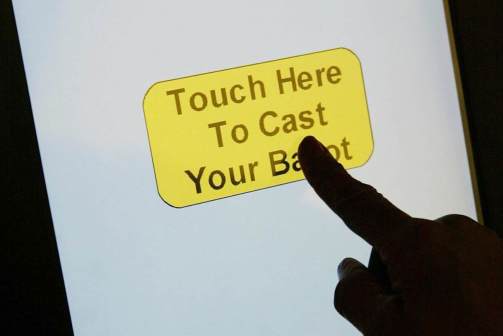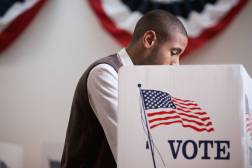Survey: Online voting could boost turnout, despite security concerns

States could generate a substantial boost in voter turnout by letting people cast their ballots online, according to the results of a new survey.
In a poll of 3,649 eligible voters conducted by the firm Public Policy Polling and commissioned by Consumer Reports, surveyors found that 33 percent said they’d be more likely to vote in the November election if they could do so online. Additionally, 67 percent of respondents who said they currently weren’t likely to vote also told researchers that they prefer online voting to traditional methods.
For people who told pollsters that they were merely “somewhat likely” to vote, 60 percent said the option to vote online would increase the chances that they would cast a ballot. The surveyors caution these results could only lead to a 7 percent boost of total voters, but that would still represent an increase of thousands of ballots cast.
The researchers note that these changes might not have an effect on any particular political party — of those who said online voting could bring them into the electoral process, 48 percent said they were independents, compared to 28 percent Democrats and 24 percent Republicans — but it could help to change the demographics of the election.
Of the group the pollsters identified as “potential newcomers” due to online voting, 69 percent were women and 22 percent were Hispanic. Of respondents who the researchers identified as “likely voters,” the numbers in those categories were 49 percent and 8 percent, respectively.
There are similar divides in age and income level. The researchers found that 42 percent of potential online voters ranged from 18 to 29-years-old, compared to just 12 percent of likely voters. Similarly, 26 percent of potential voters said they made less than $20,000 a year, compared to 13 percent of likely voters.
But regardless of whether online voting would spur someone to cast a ballot, researchers found that people generally have very favorable views of the technology.
In all, 43 percent of those surveyed said they’d prefer online voting to any method their state currently offers. Additionally, 68 percent think a move to online voting would save states millions of dollars in election costs, and 65 percent believe the practice could help boost voter turnout.
However, 65 percent also worry that online voting could “make it too easy for people to vote without putting much thought into it,” and 61 percent feel that it “would make it easier for a family member or friend to unfairly influence someone’s vote.”
[Read more: Rhode Island gov. signs online voter registration bill]
The security of online voting systems was also a major concern for respondents. A total of 84 percent believe “hackers would figure out how to tamper with votes,” and that sentiment is broadly supported by experts in the field, raising questions about how likely it is that states actually start adopting the practice anytime soon.
In a report last September, Lawrence Norden and Christopher Famighetti of New York University’s Brennan Center for Justice wrote that 30 states currently offer some form of online voting, “primarily for military and overseas voters.” However, they noted that “there is overwhelming evidence that internet voting in a national election is currently inadvisable.”
Specifically, they pointed to research from the National Institute of Standards and Technology as evidence that there are still threats that could make online voting problematic.
In a 2011 report, researchers with the agency note that there are “significant challenges” facing online voting systems.
They suggest that authenticating the identity of voters electronically is a “difficult problem,” as any authentication technology might prove “difficult or expensive to deploy” and “personally owned computers may not be able to interface with these methods,” not to mention the security concerns inherent in any system.
“Since the voter’s personal computer is outside the control of election officials, it is extremely difficult to protect against software attacks that could violate ballot secrecy or integrity or steal a voter’s authentication credentials,” the NIST researchers wrote.
Indeed, in 2010, security scholars at the University of Michigan answered a challenge issued by Washington, D.C.’s government to hack an online voting system the city was testing, infiltrating the network with ease.
“Within 48 hours of the system going live, we had gained near complete control of the election server,” they wrote in a 2012 paper. “We successfully changed every vote and revealed almost every secret ballot. Election officials did not detect our intrusion for nearly two business days — and might have remained unaware for far longer had we not deliberately left a prominent clue.”
Nevertheless, Norden and Famighetti expect that public demand for a move to online voting will likely only grow louder in the coming years.
“As these [election] officials continue to be squeezed by the cost of replacing aging voting technology, the battle over internet voting between vendors and advocates in favor of such systems on the one hand, and election integrity groups and security experts on the other, will likely intensify,” they wrote.
Myrna Perez, another Brennan Center researcher, is similarly wary of online voting systems, but in a January paper, she suggests that there is a path forward for states considering such a transition.
Namely, she feels officials can create secure systems by following several recommendations from technologists. She stresses that systems need to be “end-to-end verifiable,” meaning that both voters and auditors “can see that voter choices were recorded and counted properly.”
But at the same time, she charges that these systems have to be usable for voters, and the aforementioned end-to-end techniques “can add complexity to the voting process, reducing usability.”
Yet more than anything else, Perez wants to see systems tested rigorously before they go live, and she warns that “internet voting systems should not be unveiled for the first time in a high-turnout election” like the one approaching in November.
Contact the reporter at alex.koma@statescoop.com, and follow him on Twitter @AlexKomaSNG.





